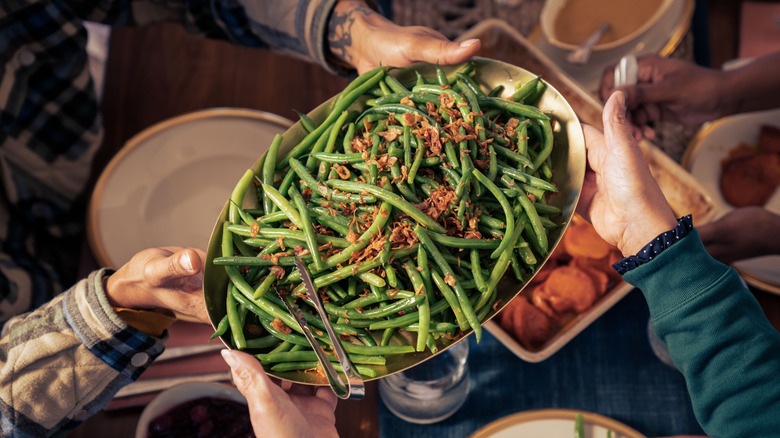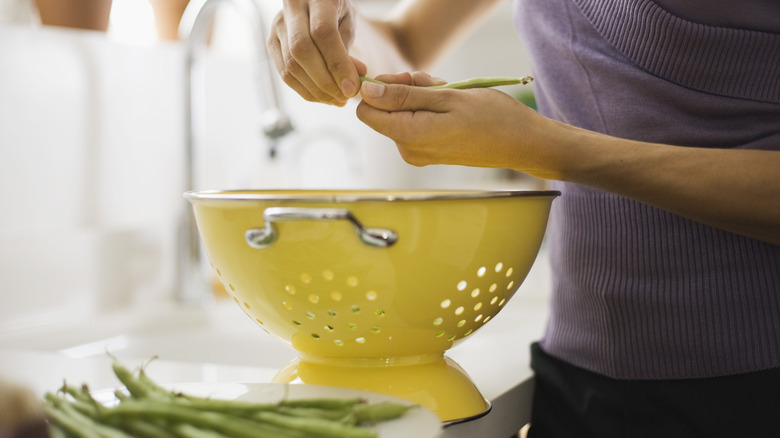Green Beans Have An Unexpected Amount Of Protein
When we think of protein, we often look at lean meats, eggs, nuts and seeds, lentils, and tofu. Even if we were to consider the leafy green varieties for protein, we may land on spinach, asparagus, and green peas.
But did you know that there's another inexpensive and common staple commonly found in refrigerators that has an unexpected amount of protein?
One cup of green beans (also called string beans or snap beans) has about 1.82 grams of protein, per the U.S. Department of Agriculture. As explained by registered dietician, Malina Malkani (via Everyday Health), "Green beans pack tons of nutrition into a small number of calories." Although they have the name "green" attached to them, these nutritious vegetables come in a variety of colors, like yellow, purple, or with red spots. The trouble with consuming enough protein, most times, is that we tend to rely on the known "heavyweights" which often means we lack variety in our diet. Adding green beans into a casserole or all on their own as a salad or tasty curry is a refreshing way to mix up your protein intake. In addition to protein, green beans bring a lot more to the table.
Why green beans are good for you
There's a reason why your mother told you not to forget the green beans on your plate while you focused on everything else but the superfood. They may not taste as amazing as mashed potatoes (although this depends on how you make them and varied palates, of course), but they come packed with a whole lot of nutrients, most important of which are vitamins A, C, and K.
They contain zero fat and one cup has 3.4 grams of fiber, 37 milligrams of calcium, 1.04 milligrams of iron, 25 milligrams of magnesium, and 209 milligrams of potassium. Their fiber content is great when it comes to gut health and digestion while also helping you feel full for longer. As explained by registered dietitian Lara Whitson to Cleveland Clinic, "Green beans contain almost the exact same amount of fiber and natural sugar, which offers a better nutritional balance than most processed foods. So, you won't experience that rise and fall in blood sugar that makes you feel famished and sluggish."
The vitamin K content in green beans can benefit your bones too. This fat-soluble vitamin aids your body in making proteins essential for blood clotting and healthy bones. The vitamin C component in this vegetable is great for your immune system health. Other health benefits of consuming green beans include boosting heart health, preventing anemia (thanks to its iron profile), and fighting cancer with its plant pigment called chlorophyll.
How you can add green beans to your diet
If you've ever been a part of a holiday meal, you probably already know that green beans make an appearance in most homes. But you don't have to wait until the end of the year. There are plenty of great recipes for green beans that are both healthy and delicious — like garlic parmesan green beans, healthy green bean casserole your family will beg for, or even an Asian-inspired Sri Lankan green bean curry. Green bean salads are a great way to add multiple different protein sources to one dish.
The fresh or frozen kind is what you should aim to buy but the canned stuff is okay too, as long as you check for sodium content. If you can't find the low-sodium kind, simply rinse off the salt before you add them to a dish. When cooking the fresh or frozen variety, experts recommend that you avoid boiling the green beans as this takes away the nutrients. You could however blanch them for a few minutes to remove any harmful bacteria but make sure you throw them in ice-cold water right after to stop the cooking process. Consuming them raw could cause digestive issues for some because of proteins called lectins that are found in them and a word of caution for those on blood thinning medication too. Since vitamin K aids blood clotting, run this dietary choice by your doctor before you add it to your meals.
Bought too many green beans? Place them unwashed in a plastic ziplock bag and put them in the refrigerator crisper. They should be good for about a week. Alternatively, you can freeze them for up to a year.



